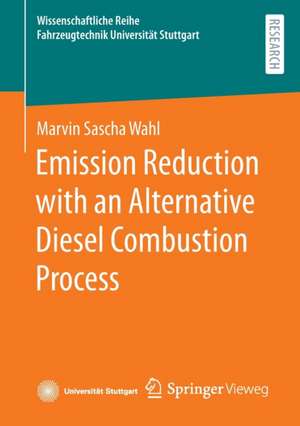Emission Reduction with an Alternative Diesel Combustion Process: Wissenschaftliche Reihe Fahrzeugtechnik Universität Stuttgart
Autor Marvin Sascha Wahlen Limba Engleză Paperback – 28 iun 2023
Din seria Wissenschaftliche Reihe Fahrzeugtechnik Universität Stuttgart
- 13%
 Preț: 422.56 lei
Preț: 422.56 lei - 13%
 Preț: 422.56 lei
Preț: 422.56 lei - 13%
 Preț: 427.62 lei
Preț: 427.62 lei - 13%
 Preț: 475.97 lei
Preț: 475.97 lei - 13%
 Preț: 449.76 lei
Preț: 449.76 lei - 13%
 Preț: 423.19 lei
Preț: 423.19 lei - 13%
 Preț: 424.77 lei
Preț: 424.77 lei - 13%
 Preț: 422.88 lei
Preț: 422.88 lei - 13%
 Preț: 399.81 lei
Preț: 399.81 lei -
 Preț: 446.26 lei
Preț: 446.26 lei -
 Preț: 445.12 lei
Preț: 445.12 lei -
 Preț: 446.08 lei
Preț: 446.08 lei -
 Preț: 448.58 lei
Preț: 448.58 lei -
 Preț: 444.52 lei
Preț: 444.52 lei -
 Preț: 345.71 lei
Preț: 345.71 lei - 15%
 Preț: 434.65 lei
Preț: 434.65 lei -
 Preț: 448.38 lei
Preț: 448.38 lei -
 Preț: 448.76 lei
Preț: 448.76 lei -
 Preț: 446.65 lei
Preț: 446.65 lei -
 Preț: 345.33 lei
Preț: 345.33 lei - 20%
 Preț: 381.40 lei
Preț: 381.40 lei - 15%
 Preț: 436.76 lei
Preț: 436.76 lei -
 Preț: 447.62 lei
Preț: 447.62 lei -
 Preț: 344.14 lei
Preț: 344.14 lei -
 Preț: 344.90 lei
Preț: 344.90 lei -
 Preț: 446.47 lei
Preț: 446.47 lei -
 Preț: 378.34 lei
Preț: 378.34 lei -
 Preț: 446.47 lei
Preț: 446.47 lei -
 Preț: 446.08 lei
Preț: 446.08 lei -
 Preț: 445.88 lei
Preț: 445.88 lei -
 Preț: 445.12 lei
Preț: 445.12 lei -
 Preț: 446.08 lei
Preț: 446.08 lei -
 Preț: 444.13 lei
Preț: 444.13 lei -
 Preț: 448.97 lei
Preț: 448.97 lei - 15%
 Preț: 463.85 lei
Preț: 463.85 lei -
 Preț: 445.70 lei
Preț: 445.70 lei -
 Preț: 481.79 lei
Preț: 481.79 lei - 15%
 Preț: 493.05 lei
Preț: 493.05 lei - 15%
 Preț: 435.77 lei
Preț: 435.77 lei -
 Preț: 346.27 lei
Preț: 346.27 lei -
 Preț: 445.70 lei
Preț: 445.70 lei -
 Preț: 379.48 lei
Preț: 379.48 lei -
 Preț: 443.75 lei
Preț: 443.75 lei - 15%
 Preț: 464.32 lei
Preț: 464.32 lei -
 Preț: 448.58 lei
Preț: 448.58 lei -
 Preț: 447.99 lei
Preț: 447.99 lei -
 Preț: 447.24 lei
Preț: 447.24 lei -
 Preț: 445.88 lei
Preț: 445.88 lei -
 Preț: 445.49 lei
Preț: 445.49 lei -
 Preț: 445.49 lei
Preț: 445.49 lei
Preț: 719.13 lei
Preț vechi: 876.99 lei
-18% Nou
Puncte Express: 1079
Preț estimativ în valută:
137.63€ • 143.31$ • 116.31£
137.63€ • 143.31$ • 116.31£
Carte tipărită la comandă
Livrare economică 10-24 martie
Preluare comenzi: 021 569.72.76
Specificații
ISBN-13: 9783658420932
ISBN-10: 3658420936
Pagini: 124
Ilustrații: XXXV, 124 p. 40 illus., 22 illus. in color.
Dimensiuni: 148 x 210 mm
Greutate: 0.2 kg
Ediția:1st ed. 2023
Editura: Springer Fachmedien Wiesbaden
Colecția Springer Vieweg
Seria Wissenschaftliche Reihe Fahrzeugtechnik Universität Stuttgart
Locul publicării:Wiesbaden, Germany
ISBN-10: 3658420936
Pagini: 124
Ilustrații: XXXV, 124 p. 40 illus., 22 illus. in color.
Dimensiuni: 148 x 210 mm
Greutate: 0.2 kg
Ediția:1st ed. 2023
Editura: Springer Fachmedien Wiesbaden
Colecția Springer Vieweg
Seria Wissenschaftliche Reihe Fahrzeugtechnik Universität Stuttgart
Locul publicării:Wiesbaden, Germany
Cuprins
Alternative Diesel Combustion.- Premixed Combustion: The Positive and Negative Influence on Emission.- Premixed Charge Compression Ignition.
Notă biografică
Marvin Sascha Wahl did his doctorate in the field of Automotive Powertrains at the Institute of Automotive Engineering (IFS), University of Stuttgart, Germany. His research focused on the investigation of diesel engine combustion.
Textul de pe ultima copertă
Marvin Sascha Wahl presents the possibilities for optimising diesel engine combustion. In the advanced process of partially premixed diesel combustion, nitrogen oxide and soot emissions can be minimised at the same time. A new feature is the possibility of applying this strategy up to 2000 revolutions and 10 bar indicated mean pressure. In this work, various effective parameters are also compared and correlated with each other. A final comparison with conventional diesel combustion shows the advantages and disadvantages and evaluates them.
Contents
- Alternative Diesel Combustion
- Premixed Combustion: The Positive and Negative Influence on Emission
- Premixed Charge Compression Ignition
Target Groups
- Researchers and students of mechanical engineering and natural sciences
- Research and development engineers in these fields, especially in the automotive segment
About the Author
Marvin Sascha Wahl did his doctorate in the field of Automotive Powertrains at the Institute of Automotive Engineering (IFS), University of Stuttgart, Germany. His research focused on the investigation of diesel engine combustion.
Caracteristici
Applying of this strategy up to 2000 revolutions and 10 bar Various effective parameters are compared and correlated Final comparison shows the advantages and disadvantages
